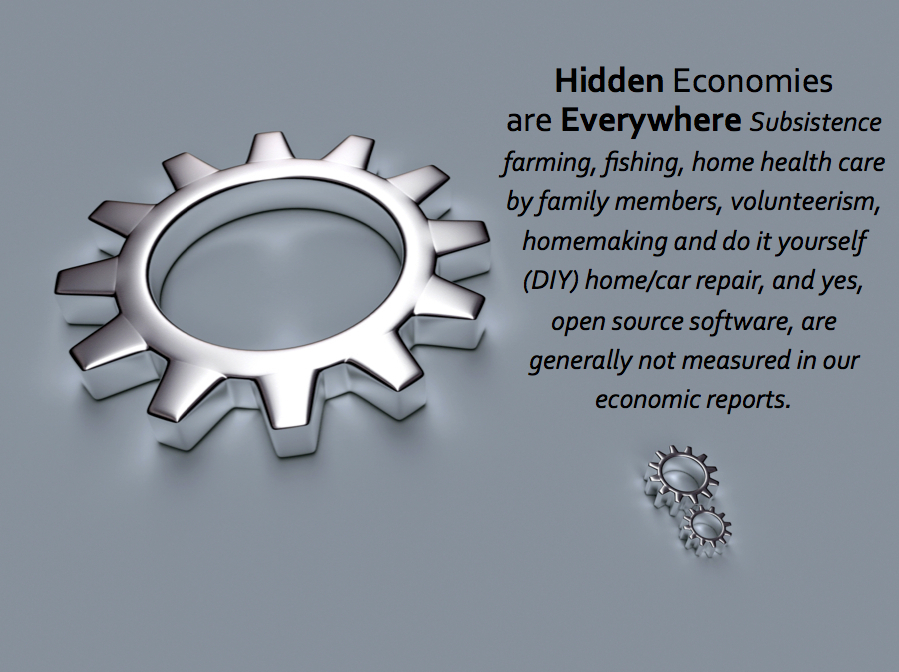Because the Internet’s infrastructure is largely dependent on open source software and open protocols, it’s fair to say that open source has played a significant role in the economic impact of the Internet. This impact is both direct—in the revenues of Internet companies themselves—and indirect, in the increased revenues attributable to businesses because of increased visibility, efficiencies, or commerce on the Internet. But because open source software is not monetized directly by most of those benefiting from its use, it tends to disappear from economic analysis.
Web hosting shows how open source software impacts the economy: web hosting companies rely on open source software to provide the infrastructure required to generate monthly subscription fees, small and medium sized businesses (SMBs) get low cost access to the Web and the open source tools to build a web presence—extending access to customers and transactions for existing companies, and creating a new breed of company that could not exist without the Web.
In this report, we use a unique data set, as well as survey data, provided by the Bluehost division of Endurance International Group, a web hosting company that provides hosting services to over 2 million customers, most of them small and medium sized businesses. There are areas where we believe Bluehost’s data provides a reasonable proxy for the SMB hosting market. The Bluehost data is used to analyze the actual software used by their customers, estimating the cost savings provided by open source software. We project the total economic impact of open source software as an enabler of the web hosting market as well as the economic impact on the SMBs who make up its customers.
Bluehost offer customers a web infrastructure and programming tools rich with open source components like PowerDNS, Linux, Apache, and MySQL, and open source programming languages like PHP, JavaScript, Perl, Python, and Ruby. Bluehost also offers open source tools like Content Management Systems (CMSs), dominated by WordPress, and e-commerce tools like osCommerce, Magento, and PrestaShop.
While offering open source software via web hosting and domain name registration is a multi-billion dollar business, we show how open source generates even greater economic impact by creating a platform fostering the increased success of the small and medium sized businesses that make up the majority of web hosting customers.
Here is some of what we learned from the Bluehost data and follow-on research:
- 60% of web hosting usage is by SMBs, 71% if you include non-profits. Only 22% of hosted sites are for personal use.
- 75% of customers build their own site using simple site-builder tools. Another 6% have it built by a family member. Only 13% use professional web developers.
- The majority of the websites are informational; only 14% have an online store (including non-profits that take donations online).
- Nonetheless, nearly 20% of businesses in the survey say they derive more than 50% of their revenue from their website.
- The majority of hosted businesses are very small. Only 15% have revenues in excess of $50,000/year, yet collectively, we believe these businesses represent a trillion dollars of economic output.
- PayPal is the dominant payment mechanism, outstripping direct credit card payments by nearly 2:1.
- WordPress is a far more important open source product than most people give it credit for. In the SMB hosting market, it is as widely used as MySQL and PHP, far ahead of Joomla and Drupal, the other leading CMSs.
- Languages commonly used by high-tech startups, such as Ruby and Python, have little usage in the SMB hosting market, which is dominated by PHP for server-side scripting and JavaScript for client-side scripting.
- Open source hosting alternatives have at least a 2:1 cost advantage relative to proprietary solutions.
Get Economic Impact of Open Source on Small Business: A Case Study now with the O’Reilly learning platform.
O’Reilly members experience books, live events, courses curated by job role, and more from O’Reilly and nearly 200 top publishers.


